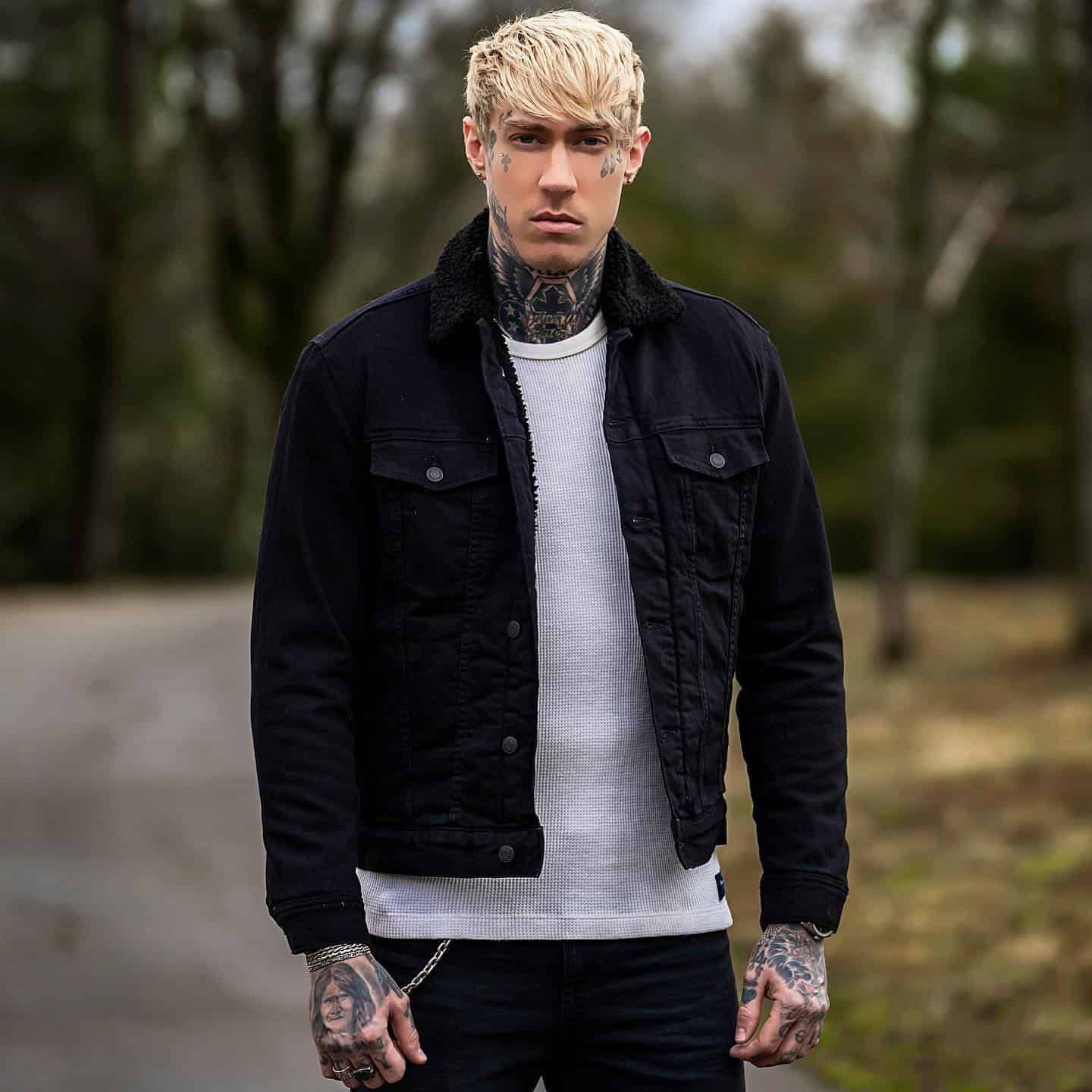Picture this: it’s the early 2000s, and you’re at a My Chemical Romance concert, awash in a sea of black eyeliner, neon hair, and skinny jeans so tight you can barely breathe. Welcome to the world of scene fashion, a style that burst onto the alternative fashion landscape like a power chord from a Fender Stratocaster.
Born from the unholy union of punk, emo, and indie music, scene style was more than just a fashion statement – it was a lifestyle, a way for angsty teens to express their individuality in a world that just didn’t understand them.
It was a snubbed nose to the mainstream, a sartorial rebellion that screamed, “I’m not like you, and I don’t want to be.” Take that, mom!

What Is Scene Style?
So, what exactly is scene style? Imagine skinny jeans paired with graphic band tees, topped off with a healthy dose of black eyeliner and a hairstyle that looks like it was attacked by a rabid straightener. It’s a look that’s equal parts punk rock and Hello Kitty, with a dash of “I’m so misunderstood” thrown in for good measure.
But scene fashion is more than just a collection of clothing items – it’s a reflection of the music that inspired it. Bands like Hawthorne Heights, Cute Is What We Aim For, and Taking Back Sunday were the soundtrack to the scene kid’s life, and their fashion choices reflected that.
It was a way to show the world that you were part of something bigger than yourself, a community of like-minded individuals who just got it.

The Evolution of the Scene Aesthetic
The Early 2000s Scene Fashion: Origins and Influences
Let’s take a trip back to the early 2000s, shall we? Emo and punk music were all the rage, with bands like Mayday Parade, Paramore, and Escape the Fate dominating the airwaves.
These bands didn’t just influence the music scene – they also had a major impact on fashion. Tight jeans, black eyeliner, and band tees became the uniform of choice for angsty teens everywhere.
But scene fashion didn’t just appear out of nowhere – it had its roots in the goth and glam rock subcultures of the past. Scene kids took elements of these styles, like dark colors and androgynous silhouettes, and added their own pop-punk twist.
Mid-2000s Scene Fashion: The Rise of Social Media
As social media platforms like MySpace exploded (Hi, Tom!) in popularity, so did scene fashion. Suddenly, scene kids had a platform to showcase their unique style to the world, and they ran with it. Brightly colored hair, skinny jeans from brands like Tripp NYC and Lip Service, and band merch from Hot Topic became the go-to look.
“Scene kings” like Jeffree Star and Jac Vanek rose to fame thanks to their massive online followings. We all remember how to take a good selfie, right? Kids these days are holding the cameras waaaayyy too low.
Late 2000s to Early 2010s: Mainstream Recognition
By the late 2000s, scene fashion had gone mainstream. High street brands like H&M and Forever 21 started incorporating elements of the style into their collections, while celebrities like Pete Wentz and Skrillex brought the look to the red carpet. The eyeliner business was bumpin’!
2010s Onwards: Evolution and Legacy of Scene Style
Fast forward to today, and although the scene look of the early 2000s may no longer be at the height of its popularity, its influence can still be seen in current men’s fashion trends.
Skinny jeans have become a staple of the modern male wardrobe, and bold hair colors and graphic tees remain popular among fashion-forward guys. You can’t kill scene, baby.

Key Components of Scene Style for Men
So, what do you need to pull off the scene look? Let’s break it down:
Skinny Jeans: The Foundation
Skinny jeans are the backbone of scene fashion. Brands like Levi’s and Cheap Monday help popularize the trend with their super-tight fits and punk-inspired washes. If you can get them on easily, they’re too big.
Band Tees: Music as Identity
Music has so heavily inspired the scene aesthetic that it’s a main feature of the style. Band tees are more than just a fashion statement in the scene world—they are a way to show your particular flavor of scene band. The lesser known, the better.
Hot Topic is the go-to spot for official band merch, and vintage tees from classic rock and metal bands are also highly sought after.
Accessories: Personalizing the Look
Accessories are key to pulling off the perfect scene outfit. Studded belts from Hot Topic, bandanas from thrift stores, and Vans sneakers are all must-haves. Let’s not forget paper clips as earrings and razor blade necklaces. Safety wasn’t really a huge concern.

Types of Scene Fashion
This isn’t a one-note style. Within the broader scene aesthetic, there are several substyles that have emerged, each with its own unique flavor:
Emo Scene Fashion
Black on black on black, baby. Emo scene fashion is all about channeling your inner tortured artist. Black skinny jeans, band tees, and heavy eyeliner are the hallmarks of this style, often paired with a brooding expression and a journal full of angsty poetry.
Indie Scene Fashion
Indie scene fashion is a bit more laid-back, with a focus on vintage finds and layered, casual pieces like cardigans and plaid shirts. Accessories like fedoras and handmade jewelry add a quirky, artistic touch.
Cyber Scene Fashion
For the more futuristic-minded scene kid, there is cyber scene fashion. This style incorporates elements of cyberpunk and rave culture, with neon colors, LED accessories, and digital prints creating a high-tech, almost alien look. Excellent rave ‘fits!
Skater Scene Fashion
What if you skate and love Pierce the Veil? Fear not, here’s where you belong. Skater scene fashion merges the casual, rebellious spirit of skate culture with the distinctive scene aesthetic.
Graphic tees, skinny or baggy jeans, and sneakers are the key components, accessorized with beanies, crazy big skate shoes, and, of course, a well-loved skateboard.
Hardcore Scene Fashion
Watch out for these cool guys. Hardcore scene fashion is all about embodying the intensity and aggression of hardcore punk music. Band merch, denim vests with patches, and combat boots are staples of this style, which favors a minimalist, no-frills approach.

Scene Hairstyles & Grooming Trends
Scene hair is all about experimentation – the bolder, the better. In addition to the classic “emo swoop,” popular styles include:
- The “scene mullet”: Short in the front, long in the back, and often dyed a bright color.
- The “devil lock”: A single, elongated strand of hair that hangs down over the face.
- The “crunk hair” look: Named after the hip-hop subgenre, this style involves teasing the hair to create a wild, unruly look.
As for grooming, scene guys often embrace a more androgynous look, with many opting for clean-shaven faces or carefully styled facial hair. This was a big time for hair straighteners.

Men’s Scene Style Icons
The scene world has no shortage of fashion icons, but a few names stand out:
Bert McCracken
Bert McCracken, lead singer of The Used, is known for his wild hair and bold makeup looks. His signature style often includes skinny jeans, graphic tees, and a healthy dose of eyeliner. The pink was especially iconic.
McCracken’s fearless approach to fashion has made him a role model for scene kids everywhere, proving that it’s possible to be both masculine and unabashedly stylish.
Trace Cyrus
Trace Cyrus, brother of Miley and member of Metro Station, helps popularize the emo mullet. Long swoop bangs, short on top, and long at the back. Who knew it would work so well? Cyrus pairs his bold hair with equally bold outfits, often incorporating elements of punk and glam rock into his look.
Oli Sykes
Oli Sykes, lead vocalist of Bring Me The Horizon, is a fixture on the Warped Tour scene with his skinny jeans and band tees. Sykes’ style is a perfect blend of hardcore and high fashion, with designer pieces mixed in with vintage finds and DIY elements. His tattoos and piercings only add to his edgy, rebellious vibe.
This cutie also wasn’t afraid to flash those pearly whites and stand out with a smile in an otherwise brooding setting.

Scene Outfits for Men: How to Wear the Scene Aesthetic
Putting together the perfect scene outfit is all about mixing and matching key pieces. Here’s a sample outfit formula:
- Start with a pair of black skinny jeans from a brand like Tripp NYC or Lip Service.
- Add a graphic band tee from your favorite scene band – bonus points if it’s vintage or from a small independent brand.
- Layer with a zip-up hoodie or studded denim vest.
- Accessorize with a studded belt, bandana, and chunky skate shoes like Vans or DC.
- Don’t forget the hair and makeup – style your locks into a classic “emo swoop” or experiment with a bold color, and smudge on some black eyeliner for good measure.
Final Verdict
Although the heyday of scene fashion may have passed, its influence can still be felt in the world of men’s fashion. From the enduring popularity of skinny jeans to the rise of gender-fluid fashion, the scene aesthetic helps pave the way for a more expressive, individualistic approach to personal style.
So whether you’re a former scene kid looking to relive your glory days, or a modern-day fashionisto looking to add some edge to your wardrobe, don’t be afraid to take a cue from the scene playbook. With the right mix of key pieces and a fearless attitude, you too can channel your inner emo prince (guyliner optional).
FAQ
-
-
Some key brands in the scene fashion world include Hot Topic, Tripp NYC, Lip Service, To Write Love On Her Arms, and Glamour Kills.
-
Popular scene hairstyles include the classic “emo swoop” (long, side-swept bangs), the “scene mullet” (short in the front, long in the back, but make it spikey), and brightly colored dye jobs. Use plenty of hairspray and teasing to achieve maximum volume and texture.
-
Bands like My Chemical Romance, Fall Out Boy, Taking Back Sunday, The Used, and Bring Me The Horizon are all hugely influential in the scene subculture.
-
Studded belts, bandanas, oversized headphones, and chunky skate shoes like Vans or DC are all must-have accessories in the scene world.
-
Try incorporating key scene pieces like band tees, skinny jeans, and bold accessories into your wardrobe, but balance them out with more modern, streamlined pieces for an updated take on the look. Don’t be afraid to experiment with bold colors and textures, and let your individual style shine through.
-



